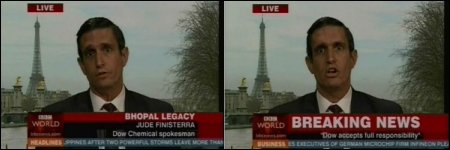December 05, 2004
20 Years After Bhopal: The Yes Men Pull Off Dow Chemical Hoax on the BBC

As for the BBC story, the news agency was apparently contacted by a "Mr. Finisterra," who claimed to speak for Dow Chemical and backed up his claim by referring the BBC to a fake website for Dow that "confirmed" his identity. He requested an interview on the anniversary of the Bhopal disaster (which occurred on December 3, 1984), promising to make a "significant announcement" on the show.
The announcement was that, Dow Chemical had decided to take full responsibility for Union Carbide's disaster and pay the families of the victims and the survivors of the tragedy $12 billion (about 25% of Dow's current market cap) in compensation for their losses. Here’s the Yes Men’s statement of what went on and how they pulled it off:
-
On November 29, an email comes in to DowEthics.com: BBC World Television wants a Dow representative to discuss the company's position on the 1984 Bhopal tragedy on this, its 20th anniversary.
Knowing Dow's history of gross negligence on this matter, we think it unlikely they will send a representative themselves—and if they do, he or she will likely only reiterate the old nonsense yet again, which will be depressing for all concerned. Yes, we'd better just do their PR for them.
Since we can't possibly afford to go to London with our pathetic American dollars, we ask to be booked in a studio in Paris, where Andy is living. No problem. Mr. Jude (patron saint of the impossible) Finisterra (earth's end) becomes Dow's official spokesperson.
What to do with the five or so minutes he'll be allotted? We briefly consider embodying the psychopathic monster that is Dow by explaining in frank terms how they (a) don't give a rat's ass about the people of Bhopal and (b) wouldn't do anything to help them even if they did. Which they don't. This would be familiar territory for Andy: he did something similar representing the WTO on CNBC's Marketwrap.
Instead we settle on having the impossible Jude announce a radical new direction for the company, one in which Dow takes full responsibility for the disaster. We will lay out a straightforward ethical path for Dow to follow to compensate the victims, clean up the plant site, and otherwise help make amends for the worst industrial disaster in history.
There are some risks to this approach. It could offer false hope to people who have suffered 20 years because of Dow and Union Carbide. But all hopes are false until they're realized, and what's an hour of false hope to 20 years of unrealized ones? If it works, this could focus a great deal of media attention on the issue, especially in the US, where the Bhopal anniversary has often gone completely unnoticed. Who knows—it could even somehow force Dow's hand.
After all, the real hoax here is Dow's claim that they can't do anything to help. They have conned the world into thinking they can't end the crisis, when in fact it would be quite simple. What would it cost to clean up the Bhopal plant site, which continues to poison the water people drink, causing an estimated one death per day?
We decide to show how another world is possible, and to direct any questions about false hopes for justice in Bhopal directly to Dow.
Another problem we anticipate is that this could result in some backlash for the BBC. This is bothersome, because they have covered Bhopal very well, infinitely better than what we're used to in the US. We would much rather hoax CBS, ABC, NBC, or Fox, but none of those could give that rat's ass about Bhopal, and so none of those has approached us.
In any case, it didn't seem to hurt CNBC when "Granwyth Hulatberi" appeared as WTO spokesperson. It was a simple mistake, and one that anyone could make. Intelligent people will not question the excellence of BBC's overall coverage because of an unavoidable error, especially if it is caught quickly and provides for some interesting discussion that wouldn't have happened otherwise.
Frankly, I think it’s a funny way to get Dow Chemical moving on the matter of Bhopal, but if it works, it’s certainly an interesting and gutsy tactic. We’ll see if the guy is prosecuted for stock manipulation though, as it caused quite a day of volatility and uproar with investors, as one might imagine.
- Arik
Posted by Arik Johnson at December 5, 2004 04:57 PM | TrackBack "Competitive Intelligence applies the lessons of competition and principles of intelligence to the need for every business to gain awareness and predictability of market risk and opportunity. By doing so, CI has the power to transform an enterprise from also-ran into a real winner, with agility enough to create and maintain sustainable competitive advantage."
"Competitive Intelligence applies the lessons of competition and principles of intelligence to the need for every business to gain awareness and predictability of market risk and opportunity. By doing so, CI has the power to transform an enterprise from also-ran into a real winner, with agility enough to create and maintain sustainable competitive advantage."
